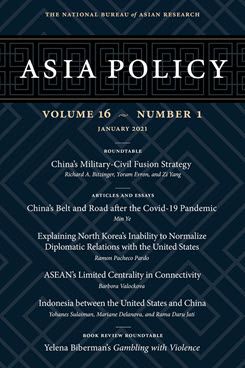China’s Shift from Civil-Military Integration to Military-Civil Fusion
This essay examines how China has come to value Military-Civil Fusion (MCF) as a critical strategy for next-generation military-technological innovation and how the country is attempting to apply MCF to its weapons development process.
EXECUTIVE SUMMARY
MAIN ARGUMENT
MCF is part of a long-term and broad-based strategic effort by Beijing to develop China into a technological superpower by pursuing both guns and butter and using them to mutually support each other. Chinese leaders, particularly Xi Jinping, are using MCF to position the country to compete militarily and economically in an emerging technological and strategic competition with the U.S. In this respect, current efforts are far more ambitious and far-reaching than previous initiatives, particularly in their determination to fuse China’s defense and commercial economies. At the same time, China is only at the beginning of an arduous, multiyear process to leverage advanced commercial technologies for military modernization, and there is no certainty that MCF will work any better than earlier efforts. Nevertheless, it is unlikely that Xi, the Chinese Communist Party, or the People’s Liberation Army will abandon MCF anytime soon.
POLICY IMPLICATIONS
- Despite the availability of advanced technologies in the commercial sector, MCF is a gamble, and it will require considerable effort and resources to adapt and apply these technologies to military innovation. Legal, regulatory, and cultural hurdles could impede the pace and intensity of MCF.
- Nevertheless, should China successfully implement MCF and achieve significant results, the resulting “world-class” military could pose a worrying challenge to the U.S. and its allies in the Indo-Pacific.
Richard A. Bitzinger is a Visiting Senior Fellow with the Military Transformations Program at the S. Rajaratnam School of International Studies (RSIS) (Singapore). His work focuses on security and defense issues relating to the Asia-Pacific region, including military modernization and force transformation, regional defense industries and local armaments production, and weapons proliferation. Mr. Bitzinger has written several monographs and book chapters, and his articles have appeared in such journals as International Security, Orbis, China Quarterly, and Survival. He is the author of Arming Asia: Technonationalism and Its Impact on Local Defense Industries (2017) and editor of Emerging Critical Technologies and Security in the Asia-Pacific (2016).
About Asia Policy
Asia Policy is a peer-reviewed scholarly journal presenting policy-relevant academic research on the Asia-Pacific that draws clear and concise conclusions useful to today’s policymakers. Asia Policy is published quarterly in January, April, July, and October and accepts submissions on a rolling basis. Learn more


